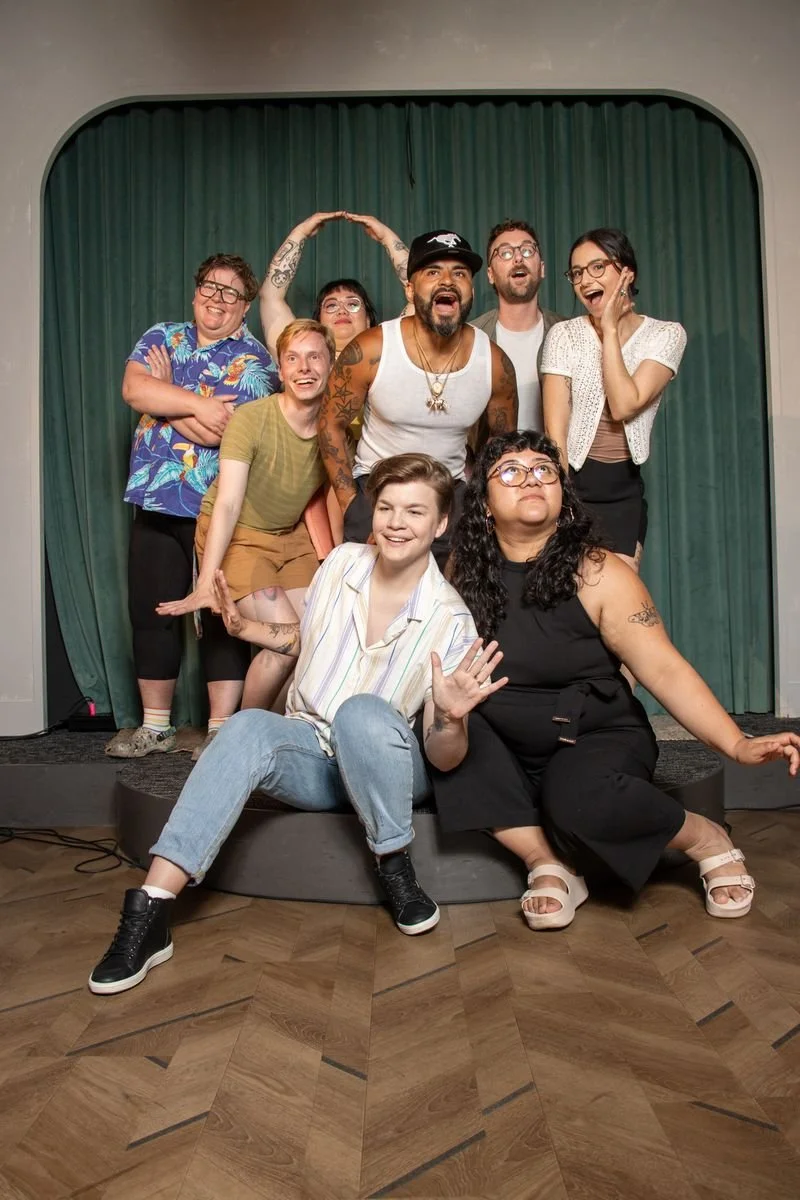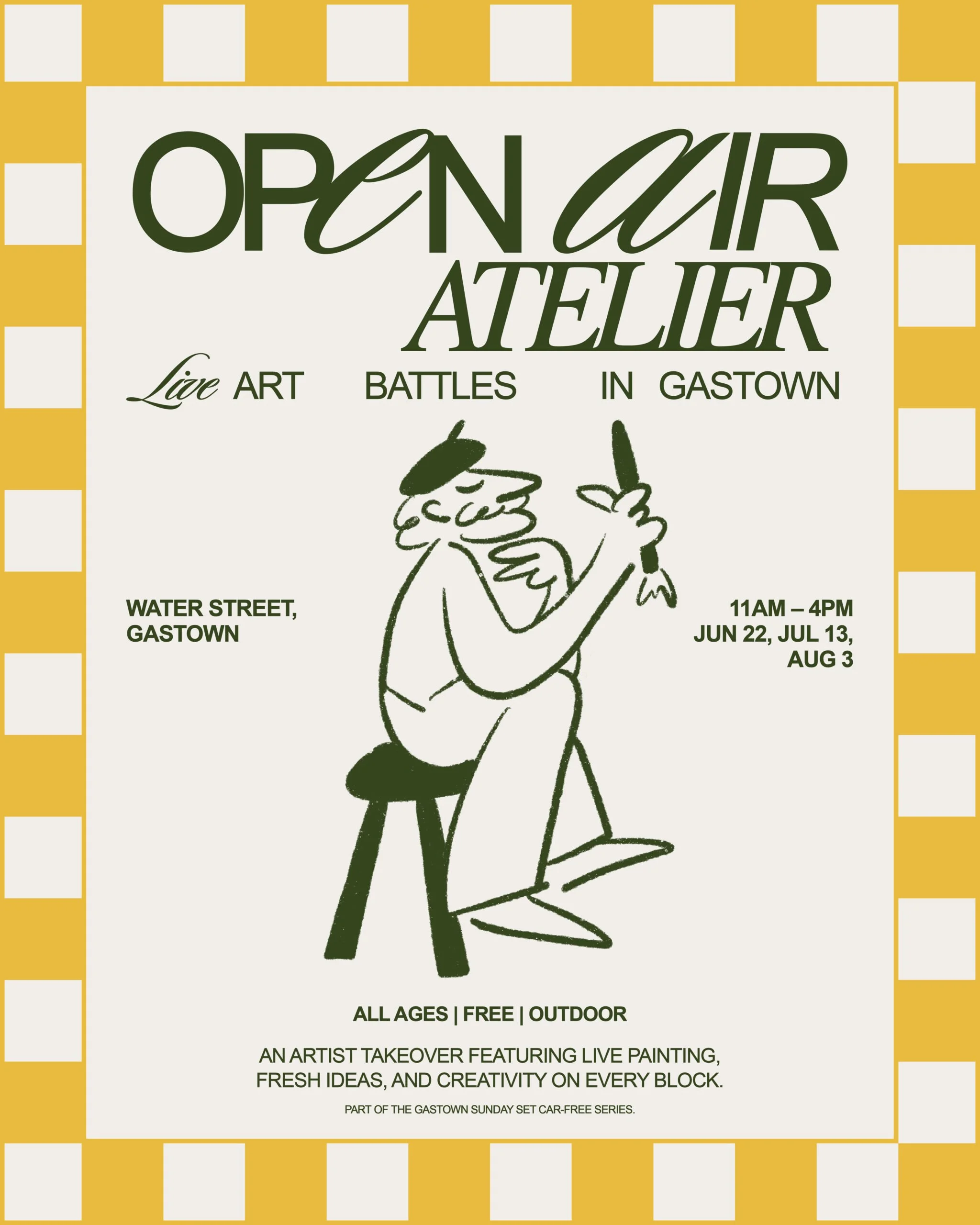Release and Relief in Stand-up Comedy: Interview with Jackie Hoffart from Killjoy Comedy Season 2
/Cast of killjoy comedy season two: Jackie hoffart, marito lopez, niki mohrdar, baby syrup, mark thomson and joanne tsung.
Vancouver director Shana Myara’s docuseries Killjoy Comedy about the future of comedy returns for a second season July 25 on OUTtv.
This season will follow 5 stand-up queer and/or racialized comics and one improv duo who are challenging the narrow lens of traditional comedy. Interweaving footage from live performances with intimate interviews, Myara’s series showcases the comedians doing their thing on stage while delving into thoughtful stories behind the bits. What brings someone to comedy? And why does it matter that they’re here?
One episode in particular features local comic, director, producer and champion of underdog comedians Jackie Hoffart. In their episode and introduction, Hoffart notes how they were “born with fart in [their] name […] but the fart is silent” before offering a poignant reflection on how being a closeted religious teen in the early 90s impacted them. This juxtaposition of silly joke with hard-earned insight fuels the docuseries.
Hoffart is also a former editor of SAD Mag, so of course we had to snag them for an interview to learn about how it felt to hold the spotlight in Killjoy Comedy Season 2, their work as a comedian and filmmaker and their thoughts on the local scene.
stand-up comedian and producer of yvr funny: Jackie hoffart
As a director of [your own docuseries] YVR Funny and producer of comedy shows like Foxhole Comedy, you usually are the one making space for others’ stories. How did it feel to be the one interviewed and spotlighted for Killjoy Comedy Season 2?
Jackie Hoffart: It’s a little bit nerve-wracking to be in front of the camera, I won’t lie. But also exciting. It’s an honour to have the tables turned. We taped it just over a year ago, I can hardly remember what I said. I hope my family will be proud and my friends will be happy to see me up there. I’m just excited to be included.
How did you get into comedy?
JH: I was inspired by one of my very best friends, Rachel Burns, who got into comedy way before I did around 2010, 2011. I wasn’t living in Canada at the time. But when I came back I started attending her shows to support her and I just remember being so shocked at the low quality of the comedy. Everyone except her was SO offensive and rude and it was quite painful to watch and that inspired me. I thought, ‘Wow, if this is the level, the bar’s pretty low. Let’s see if we can do better.’ I took a stand up class to have a cohort to learn with and an opportunity to practice in a softer setting… and then I just started. I’m not a full time comic, I’m not an every night comic. I’m a once or twice a month comic and just refused to quit for well over 10 years.
What does comedy give you as an artist and as a person?
JH: I got into stand-up comedy around the same time I got into filmmaking, and to me the draw for stand-up comedy was that it’s exercising the opposite muscles of filmmaking. It has such an immediate, contemporaneous experience, the joke is just shared in the moment with specific people, live, and it’s created, expressed, distributed and received all in the same moment.
Filmmaking is obviously tedious, it takes years, it’s very solitary and it involves so many people. I like to be involved in both because they exercise different muscles. For me it was the instant gratification that stand-up provides that was quite attractive as a creative outlet.
And actually there’s quite a lot of overlap—not just in the people involved—but when you’re trying to communicate a story or a joke that isn’t necessarily my strong suit but brevity is key. It’s important to get to the point. And the same is true when you’re talking about filmmaking, you want to be quite deliberate about every line, every look, everything has to be meaningful. Different muscles, but to me they’re both necessary.
You have deep ties with SAD Mag as a former editor. How did your work in magazine publishing prepare you for your work in comedy?
JH: There’s a connection! I’m part of the generation of SAD Magazine under Katie Stewart as the leader. Katie really fostered an environment where everyone involved in SAD Mag was able to use the project as a way to develop more of their own interests. For some people that was graphic design, and for some people that was other things. So I started the podcast [SADCAST] through SAD Mag originally and it’s grown to become something much better and more focused than anything I ever created. But at the same time, SAD Mag also offered me the opportunity to start hosting comedy shows. My involvement was happening while filmmaking and standup were becoming part of my life. You know SAD Mag is always trying to fundraise, so we’d hold comedy shows as fundraisers and those were my very first opportunities to host. We would hold comedy shows once or twice a year for several years, and that’s really how I got my leg in, in terms of confidence building and getting involved.
I was a bit more editorial than writing when it came to SAD Mag. It was always a little bit about expanding my network and finding cool interesting people who were writers rather than myself writing. The same things carry over into producing stand-up shows. Who’s interesting? Who’s funny? Who has something to say and who are we not hearing from?
How would you describe the Vancouver Comedy scene? Where is it going?
JH: When I started producing in 2017, it was a different scene in terms of anti-trans, anti-fat jokes, and even anti-woman jokes honestly. I don’t know if people’s politics have actually changed, but they make these jokes less, which for me, is an improvement I’ll take. I think that’s something. Audiences and comedians are famously sensitive in Vancouver and that serves the comedy. Especially at my shows, if someone brings a joke that’s punching down, then people aren’t going to laugh. People care about people’s experiences and who has authorship to talk about these experiences.
Who and what’s exciting to me about the scene right now: I would say people like Kay (@itsanew_kay) who's running amazing shows around town right now with trans women, femmes and thems, as well as the show Laughs in Queer—there are so many shows she’s involved in producing right now and so successfully. It’s really exciting to see. I love that that’s happening.
My goal with producing is always to become irrelevant, to not necessarily be needed, which is slowly starting to happen. Although, the Trump era of it all empowers people to push back against the diversity of everything and that’s something to be wary of. We’re not immune to that in Canada. My show and programs like Killjoy Comedy, they’re necessary because they elevate and amplify specific voices and it’s exciting to have opportunities to do that. Both through my producing stand-up, and Shana Myara through making this show, are highlighting people. As an artist, the best thing you can do is help shine the light on other people, ‘raise all the boats’ or however that saying goes. There’s also so few opportunities in comedy professionally, so it’s exciting to be featured on a TV show that’s going to be on an actual network.
What role do you see comedy having in how to contend with the rising waves of fascism, racism, and anti-trans violence we’re seeing in the larger culture?
JH: Here’s how I feel about comedy: I think it’s so important. Comedy is what we come to for relief and release and we certainly need a lot of that now more than ever.
The careers of comedians, which span from folks on an open mic to people writing shows like Hacks or Overcompensating or any of these really funny shows, so much of television is influenced and created by standup comedians. And so there’s this spectrum where comedy is really necessary and really important and there’s this other side where comedy is a kind of appetizer of criticism. It’s just a little bite of something where you can have a conversation after the show with your friends about something a comedian brought up and take the conversation further. On some level it’s this little taster of critique. It’s certainly possible and certainly necessary right now.
I think there’s a responsibility, too, as a comedian. It’s important to be silly and make silly jokes and at the same time it’s important to talk about power, impacts, real life experiences and share perspectives in a way that opens minds. I think comedy is a super accessible way to shake things up—comedy shows make a great second date.
And how will comedy solve the fascism?
JH: I mean it won’t but it will. I think we have a responsibility to lean harder into the free speech of it all and not in the way it’s been commandeered lately but in the way of really speaking truth to power. The court jester of it all. You can’t take yourself too seriously at the same time and finding that balance is every comedian’s journey.
What do you hope people will get out of watching Killjoy Comedy Season 2?
JH: I personally think Shana’s done an amazing job curating a mix of performers, especially this season. There’s just so many different points of view and life experiences and even styles of comedy between us all. And I hope people give it a watch and find someone they like and start supporting their career and follow them on social media—maybe I should aim higher for what I’m hoping for. I think the more we can do to encourage folks who think that stand-up comedy is always this terrible sexist thing to know that there’s more out there. And to support that corner of the industry to develop—I think that would be amazing.
The goal here with both Killjoy and my comedy is to expand the frame of life experience, interest, point of view and find the audience that is sometimes reluctant to engage with stand up and welcome them back. There’s something for everyone.
For Killjoy Comedy Season 2, Jackie shares how they kickstarted their regular comedy series with the intention of opening up the historically closeted stand-up comedy scene. Jackie talks body image, growing up Lutheran and finding their first audiences in the church. The season comes out on July 25, 2025.
This interview was edited for clarity and brevity.
Adèle Barclay is a writer of poetry, fiction, and nonfiction. She is the recipient of the 2016 Lit POP Award, The Walrus’ 2016 Readers’ Choice Award for Poetry and The Fiddlehead’s 2022 Fiction Prize. Their debut poetry collection, If I Were in a Cage I’d Reach Out for You won the 2017 Dorothy Livesay Poetry Prize. Her second collection, Renaissance Normcore was nominated for the Pat Lowther Memorial Award and the ReLit Award and placed third for the 2020 Fred Cogswell Award. Essays from their forthcoming memoir Black Cherry have won Gold at the National Magazine Awards, placed in contests by Room, PRISM international, and Event and received numerous nominations from The Fiddlehead, The Malahat, TNQ, and CRAFT Literary.
They teach creative writing and literature at Capilano University and live on the unceded territories of the xʷməθkʷəy̓əm (Musqueam), Skwxwú7mesh (Squamish), səlilwətaʔɬ (Tsleil-Waututh) Nations, colonially known as Vancouver, BC.







